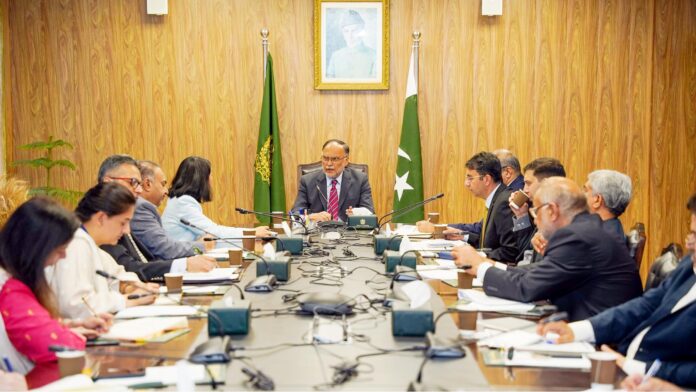ISLAMABAD, Apr 15 (APP): The Asian Development Bank’s (ADB) new Country Partnership Strategy (CPS) 2026–35 for Pakistan was discussed in a high-level meeting chaired by Federal Minister for Planning, Development and Special Initiatives, Ahsan Iqbal on Tuesday.
The session marked the beginning of a strategic dialogue aimed at laying a pathway toward sustainable growth and resilience in Pakistan, said a press release issued here.
The meeting was attended by a delegation from ADB led by Country Director Ms. Emma Fan, Secretary Planning Commission Awaise Manzur Sumra, Chief Economist Dr. Imtiaz, Vice Chancellor PIDE Dr. Nadeem Javed, members of the Planning Commission.
Ms. Emma Fan briefed the participants on the contours of the new CPS, which is designed to align ADB’s support with Pakistan’s national development agenda and socio-economic priorities. She explained that although CPS documents are typically developed for a five-year period, the new strategy is proposed as a 10-year plan to ensure predictability and continuity in addressing long-term challenges.
The CPS will focus on restoring economic growth through a country-specific approach, strengthening coordination among development partners, and enhancing the readiness and effectiveness of projects. It aims to provide customized solutions aligned with Pakistan’s development needs.
Highlighting Pakistan’s economic imperatives, Minister Ahsan Iqbal emphasized the urgent need for export-led growth. He noted that 70% of Pakistan’s economic future hinges on boosting exports and stressed the need to triple export volumes over the next decade. “We cannot grow until our exports expand significantly. We are already late in pursuing an export-driven strategy, which should have begun thirty to forty years ago,” he remarked.
Referring to the Uran Pakistan programme, the minister urged ADB to align its CPS with the government’s strategic 5Es framework—Exports, E-Pakistan, Environment, Energy, and Equity.
He reiterated that Uran represents a tangible development blueprint with eight priority sectors: agriculture, industry, services, IT, mining, manpower export, the blue economy, and creative industries. He called for ADB’s continued partnership and technical support in implementing this vision, particularly in the export sector.
He said, “ADB has been a consistent and valuable development partner for Pakistan across various sectors. We look forward to its collaboration in operationalizing our Uran Pakistan programme and moving towards our goal of becoming a trillion-dollar economy.”
Minister Ahsan Iqbal further stressed the importance of peace and harmony, political stability, policy continuity, and institutional adaptability as the four foundational elements of a sustainable growth ecosystem. He expressed confidence that with the right commitment and strategic focus, Pakistan has the potential to become a major global economy.
He referred to a 2017 report by PricewaterhouseCoopers, which projected that if Pakistan maintained its growth trajectory, it could rank among the world’s top 20 economies by 2030. Recalling the momentum in 2017, he noted that Pakistan had garnered global interest, particularly around the China-Pakistan Economic Corridor (CPEC), but political disruption derailed progress.
He emphasized the need for data-driven strategies and evidence-based policymaking. “We are not making general statements—we seek real data, global alignment, and tangible outcomes that can boost Pakistan’s export performance,” he said, calling on ADB to provide targeted research and technical assistance.

